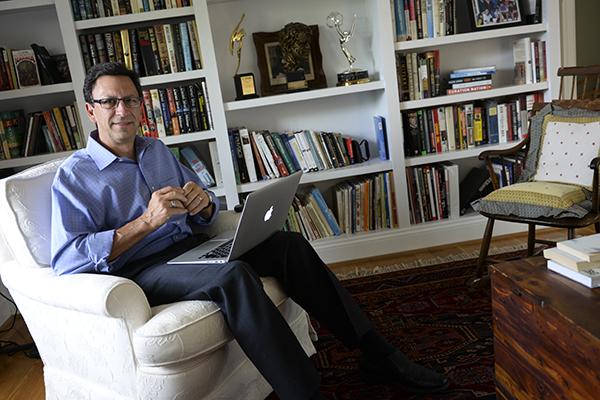Faces from primetime news may soon be asked to donate to GW’s media and public affairs school.
The School of Media and Public Affairs has raised $4 million as part of the University’s $1 billion campaign, and is now $6 million shy of its total goal with four years to go. But with a younger alumni base and a smaller number of students in each graduating class, the school’s director says he is focusing on raising money from outsiders who he thinks are interested in the school’s trajectory – even if they aren’t directly connected to GW.
Frank Sesno, who has led SMPA since 2009, said he has focused on reaching out to people who might not be attached to GW but are interested in media programs because GW’s journalism and political communication programs are some of the youngest but most prestigious in the University. Sesno, who served as CNN’s D.C. bureau chief for five years, also gives the school connections to a large network of successful journalists.
“If you just call people and ask them to write a check, maybe they’ll write a check, maybe they’ll hang up on you. But that’s kind of a dead-end conversation,” Sesno said. “We want people to believe in us, or believe in our students.”
Sesno said a portion of the money raised will go toward creating more experiential programs for students, making sure they receive as much of a learning experience outside of the classroom as they do in it.
Experiential learning makes up a significant portion of SMPA’s existing curriculum. Students can take up to two internships for class credit during their time in the school and often take classes with professors who work for news organizations like NPR or The Washington Post – giving students access to individuals with some of the most coveted positions in journalism.
He said the school will also concentrate on funding programs for graduate students, a population he said isn’t as likely to receive the same level of financial aid as undergraduates.
“We’ve reached out to private companies and individuals and others to help either create paid internships for our graduate students which I call an on-ramp to their careers,” Sesno said. “So the money that we can raise is all about increasing access and opportunity.”
The school has focused on getting resources directly to students, and, for example, gave away more than $100,000 in awards and scholarships to students on Thursday night. That was a record high for the school and an about 14 percent increase from the awards ceremony the year before.
And on Wednesday, GW announced senior Marianna Sotomayor as the first winner of the new George Washington University-White House Correspondents’ Association scholarship, earning her $2,500, a chance to meet the president and a seat at the White House Correspondent’s Association dinner. Starting with the Class of 2019, a freshman will receive $10,000 to be divide out over their four years at GW.
Sesno said providing this kind of funding can help those students to find better jobs and make more connections for post-graduation life.
“One of the things we want to create is a community, and we want a better, deeper sense of community,” he said of the school’s events, including increased opportunities for students to network with alumni.
He said he has also collaborated with the school’s new director of development Frank Dooley to work with the school’s faculty to find people who are interested in SMPA’s goals, and to introduce the school to those potential donors. Dooley declined to comment for this story.
Char Beales, president of the school’s National Council who graduated from GW in 1973, said the council has expanded in recent years, adding 10 members who are all interested in promoting the program and donating to the school out of their own pockets.
Chuck Todd, the host of NBC’s “Meet the Press,” joined the council this fall and said he hopes to use his place at GW as a launching point to create more programming for SMPA.
Beales said each member of the 18-person council works to draw in prospective donations, from asking for donations within their individual networks, or letting alumni who graduated before the school officially formed know that they are members of SMPA. Members typically join the council with the understanding that they will also lead the donation drive with personal contributions.
“We have such a strong school of media and public affairs and we have so many great alumni and friends that want to be involved, but haven’t been asked to be involved,” she said.
Robin Eberhardt contributed reporting.







